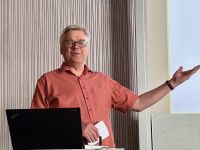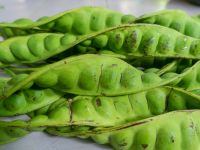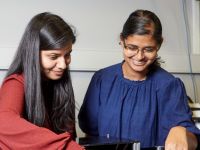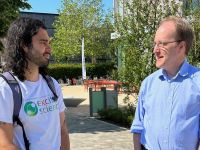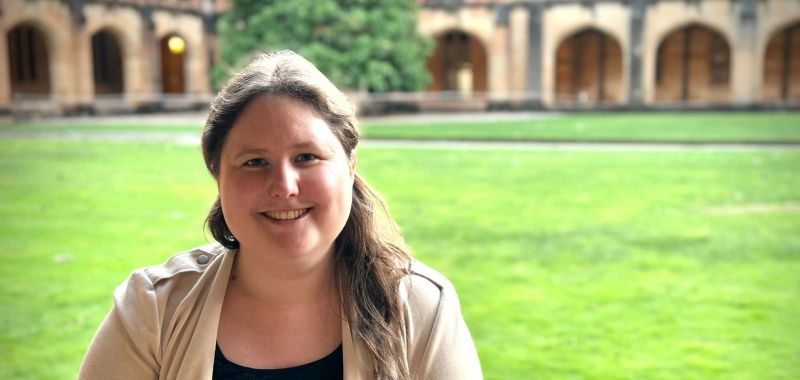
Member profile: Alicia Schuitemaker
As a computational scientist working on the formation of perovskites, it’s fitting that Dr Alicia Schuitemaker has undergone change and growth of her own to become an established Exciton Science Research Fellow.
Raised in Germany, Alicia moved to the UK to study an integrated Master of Physics at the University of Kent, which included a year at Trent University in Canada, before uprooting herself again for a PhD in Chemistry at Curtin University in Perth, Western Australia.
There was never any doubt in Alicia’s mind that she wanted to become a scientist, though, with her father serving as an inspiration to pursue postgraduate research.
Keeping it in the family
“I definitely always wanted to do science,” she said.
“In seventh grade, I knew I wanted to do A-Levels in physics, and then when I did that, I knew I wanted to do my degree in physics. I've always loved science and maths.
“My dad had a PhD and I wanted to do it because he did it. I think that was always the goal. I wasn't sure if I'd stay in academia beyond that point, but I definitely wanted to get a PhD from quite a young age.”
The steepest learning curve for Alicia upon moving to Perth was making the transition from experimental work to gain more familiarity with computation and modelling, but it’s a decision that affords her valuable flexibility in where and when she tackles her research problems.
“I remembered what one of my physics teachers at school said, ‘If you want to do a PhD, do it in theory.’ Lab work is fun, but you can still be in the lab at 10pm sometimes. Whereas on computers, you can do it whenever you want, wherever you want.”
After completing her first postdoctoral research role at Curtin, Alicia joined the Soft Matter Theory and Computation Laboratory at the University of Sydney.
Working with Associate Professor Asaph Widmer-Cooper, an Exciton Science Chief Investigator, Alicia’s role involves applying classical computational methods to investigate metal halide perovskites.
Perovskites are a class of compounds with a crystal structure boasting promising characteristics for use in next-generation renewable energy applications.
A process of discovery
“I'm trying to understand the conversion of lead iodide to methylammonium lead iodide,” Alicia said.
“It’s solid-state transition, to mimic the two-step process for forming methylammonium lead iodide for solar cells.
“I’m trying to understand how it works on an atomic scale, which, of course, isn't accessible through experiments. And then trying to eventually understand how different environmental aspects will change that and maybe help improve the quality of the crystals that can be grown in that kind of way.
“I've never worked on this particular material before, so that's new, but it's actually something I've always wanted to work on. Before this I worked on biominerals. The sort of stuff that corals are made of.”

For Alicia, the role at the University of Sydney was an ideal combination of pursuing her professional interests while also contributing to solutions to the climate crisis.
“I saw the position, and I thought that's really cool because Asaph wanted someone to do metadynamics, which is kind of my specialty. So that was really good for me,” she said.
“And then I've always kind of liked the idea of working in renewable energies, and this fit in there perfectly. So that's why I kind of came to Sydney.
“I love the idea that I'm hopefully helping with that kind of stuff and developing some better, more efficient solar cell materials. That's definitely what motivates me to keep going even when it gets a little tough.”
An unexpected bonus
While the draw of working with Asaph was the primary motivation for Alicia to move from Western Australia to New South Wales, becoming a member of a Centre of Excellence has also proven to be a major advantage.
“There's hundreds of potential collaborators just at your fingertips,” she said.
“You have a lot of training opportunities as well, opportunities that you might not get in an individual research group. I think it's definitely beneficial.
“And if I was ever to suggest what kind of research roles to look at, I would tell people to look at positions in centres of excellence, not just individual supervisors.”
As for what’s next in her career, Alicia is keeping her options open. But there’s no doubt she will remain a scientist at heart.
“I'm still not opposed to going industry, but the thing is, if you're in academia, you kind of can choose what you research, and it's more individual,” she said.

